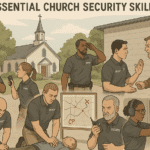The Many Aspects of Church Security
The previous articles I’ve written focused on what can be broadly characterized as mindset or attitude. The logic behind emphasizing mindset for the Church Security Team member (CSTM) is the conviction that a proper mindset is both foundational and essential for effective service on a Church Security Team (CST). Once the CSTM develops the proper attitude toward the work of the CST, the need to develop the necessary skills becomes obvious.
The essential skills for effective service on CSTs—like all skills—can be developed through purposeful, mindful, and consistent training. Empty-hand combatives, less-lethal tools, situational awareness, threat analysis, rapid problem-solving, First Aid/CPR, de-escalation techniques, and firearms proficiency must be prioritized and developed through training. Unfortunately, most CSTMs and CSTs fail at this critical point, and this failure is exacerbated by a lack of adequate budgeting and accountability for training.
In my home state, no established training requirements currently exist for CSTs. CSTMs need a current Concealed Carry Permit (IC), also known as an “enhanced permit,” and must be on a documented, approved list maintained by the church’s governing body. Experienced trainers can attest to the inadequacy of the Concealed Carry Permit’s level of training and the skill deficit most permit holders possess. Few CSTMs regularly practice combatives or martial arts, few CSTs offer threat analysis training, few CSTs encourage the use of less-than-lethal tools, and few CSTs provide medical training such as bleeding control.
The critical training deficit most CSTs possess desperately needs to be addressed and corrected. If left unattended, this deficit could result in disastrous and tragic consequences. Due to the constraints of this newsletter format, I can only raise awareness of the imminent danger facing CSTs.
If you haven’t read anything else, please focus on this closing paragraph: CSTs and their CSTMs are simply not ready for the potential challenges they’ve committed to meet. Church leaders have a moral and spiritual obligation to ensure their CSTs are adequately trained for their work. As the notable trainer John Hearne says, “It is not about the odds but the stakes.” For a CST, the stakes could not be higher. Churches must do a better job of preparing their CSTs—and Boondocks FTA can help.

